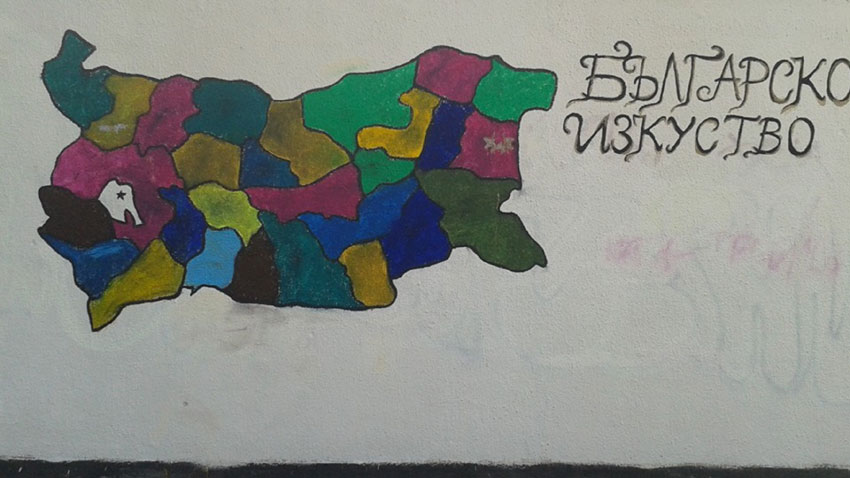He teaches them to stand up against prejudice, to walk tall and not to deny their ethnicity. For four years now young teacher Rossen Bogomilov has been working with Roma children, bringing their talents to life and also putting forth the faith in their own capabilities. The results may be freely called ‘wonder’ and those have been achieved mostly via personal example.
The child dream of a Roma kid to become a teacher made him study hard and walk on day by day – starting with the school in his village of Koinare, through the Veliko Tarnovo University and finally – at the 106th High School in the Poduene neighborhood of the capital Sofia.
Rossen has grown up among Bulgarian and Roma people and has always felt the support of his parents and teachers – up until that moment when he graduated in history and geography and started touring around Sofia schools, trying to find a job. He hit the wall of discrimination, negativism and prejudice, hearing 20 times that the children and mostly their parents wouldn’t accept him. Then only that school principal from the suburbs decided to give him a chance. The moment Rosen saw the kids’ eyes, he realized that he could be their inspiration and also a good example of knowledge.
“My major goal has always been to build up a community out of a class, since this is the only way to have a real process of study,” 27-year-old teacher Rossen Bogomilov says. “However, this doesn’t happen with some magic wand, but with a lot of focusing on the 21-century-relevant skills – teamwork, feedback, communication etc. That is why I have never divided throughout any class activities or teambuilding events the kids according to some Roma – Roma or Roma – Bulgarian principle, but this has happened only with the purpose of supporting the joint process.”
Roma children are very emotional and sensitive – sometimes this turns into an obstacle for them and that is why the teacher has aimed at creating their emotional intelligence. What are their concerns and fears?
“The first things a teacher collides with are as follows: the ‘will the others accept me?’ and ‘will I find a job?’ questions, combined with low self-esteem – luckily the latter does not exist anymore after three years of work with the kids,” Rossen explains. “At first they didn’t believe they would cope with all the tasks, but I have always been there for them – they have always been able to share their feelings and seek advice. The class participated in a student conference last year and had a public lecture, subjected Poverty and Hunger Worldwide – and this is just one example of the motivational strategies which literally throw them in deep waters. Then when they see that they can and that they have done it, they start to have faith in themselves.”
Unfortunately the lack of trust and the hatred towards the different person which evolves into aggression among the society have being transferred among kids as well. The walls of the school have been ‘decorated’ with racist inscriptions and swastikas many times and the first attempt of Rossen to take the pupils out of the ghetto ended up with insults and abuse. Then after the next display of vandalism the children painted the school wall with the map of Bulgaria and it hasn’t been desecrated yet. However, there are still writings of people, displaying their weakness through hatred.

Despite the sometimes hostile environment and the sometimes flashing inner feeling of insecurity, Rossen’s 7th graders now cope much better with the lessons, have more goals and trust more in their own capabilities. Some of them have been preparing to apply for language schools and their future professional dreams spread from footballers through teachers to doctors. Although this is their final year with Rosen Bogomilov, he will always support and advise them. “Perhaps that is why they are my first class and it is like the first love,” the teacher says in conclusion.
English version: Zhivko Stanchev
Photos: private libraryThe Bulgarian Association of Crete has been working for nine years as a bridge between Bulgaria and the Bulgarian population on the southernmost Greek territory, sometimes replacing the most important partner - the state. One of the aims of the..
For the 16th time on January 1, the Tsarevets Fortress in Veliko Tarnovo welcomed the first tourist. This is the only architectural and museum complex in the country that operates year-round and is the most visited open-air museum in..
Bulgarians across the country are welcoming the New Year with various initiatives. More than 20 members of the club of karate and yoga coach Emil Zlatev in Varna traditionally swam in the sea on January 1. They say that they never..
The President of the Republic of Bulgaria Rumen Radev has congratulated all Bulgarians at home and around the world on the arrival of..
Bulgarians across the country are welcoming the New Year with various initiatives. More than 20 members of the club of karate and yoga..
For the 16th time on January 1, the Tsarevets Fortress in Veliko Tarnovo welcomed the first tourist. This is the only architectural and..

+359 2 9336 661
